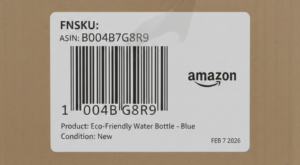
Summary: President Trump ended the de minimis exemption, imposing new tariffs on small package imports under $800 and targeting Chinese platforms like Temu and Shein. This move raises costs, disrupts supply chains, and escalates global trade tensions. Amazon sellers may benefit from reduced overseas competition but face higher import expenses and shifting pricing strategies.
Trump ends de minimis exemption, hitting Amazon's rivals Temu and Shein - But trade war looms
President Donald Trump has imposed tariffs on imports from Canada, Mexico, and China, raising costs for businesses and consumers with levies up to 25%.
Canada and Mexico threatened retaliatory tariffs, while China plans a WTO lawsuit. Trump admitted Americans may feel “some pain” as the new tariffs take effect.
Businesses, including Amazon sellers, must adapt by adjusting supply chains and pricing.
Trump Ends De Minimis Exemption
Dallas News reported that President Donald Trump has eliminated the de minimis exemption, a long-standing tariff loophole that allowed small packages under $800 to enter the U.S. duty-free. The decision is part of a broader trade crackdown against China, Canada, and Mexico.
Key Changes
- A 25% tariff now applies to most Mexican and Canadian goods.
- A 10% tariff applies to Canadian energy products and Chinese imports.
- The de minimis exemption is no longer valid, impacting direct-to-consumer shipping from China.
Why It Matters
- Chinese e-commerce giants, including Temu and Shein, relied on this loophole to ship low-cost products without tariffs.
- Amazon sellers and U.S. retailers faced unfair competition as Chinese sellers bypassed import duties.
- Lawmakers raised security concerns, warning that unchecked shipments may contain illegal or dangerous goods.
Impact on E-Commerce
- Temu and Shein may face higher costs and adjust logistics by shipping in bulk to U.S. warehouses.
- Amazon sellers could see reduced competition from cheap overseas products but may also face supply chain disruptions.
- Consumers may experience higher prices as companies pass tariff costs along.
Trump’s decision takes effect at 12:01 AM on Tuesday (Feb. 4) and is expected to reshape the e-commerce landscape in the U.S.
De Minimis Rule Details
The de minimis exemption allowed goods valued under $800 to be shipped to the US without tariffs or inspections, allowing foreign e-commerce companies like Shein and Temu to bypass import duties, gaining an advantage in the retail market.
This provision has been in place since 1938 and was raised from $200 to $800 during President Obama’s tenure. This shift could severely impact Chinese businesses as this policy shift aims to counter China’s competitive edge in the US market.
The US previously had one of the most lenient thresholds globally. The US de minimis exemption was significantly higher than other countries like the European Union (€150), Canada (CAD $20), and Australia (AUD $1,000), which have stricter limits.
Fentanyl Concerns
A Reuters report revealed that Chinese traders exploited the de minimis exception to send chemicals used for fentanyl production to the US, contributing to the opioid crisis. The US saw nearly 75,000 fentanyl-related deaths in 2023.
The Biden administration had already taken steps to curb the overuse of the de minimis exemption, claiming it allowed Chinese companies to bypass tariffs and undercut domestic competitors.
Trump’s National Security Concerns
Trump’s team cited national security reasons for ending the de minimis exemption, alongside the argument that Chinese companies’ lower import taxes put pressure on US retailers like GAP and H&M, who paid significant import duties in 2022.
Temu’s Impact
Temu, a Chinese marketplace, has become a major player in the US by offering significant discounts on various products. It is expected to generate $30 billion in sales in 2025 and has emerged as a strong competitor to Amazon and traditional retail chains.
Temporary Suspension
The current suspension of the de minimis rule is not permanent, leaving the door open for future reinstatement, which could affect US companies in the long term.
Implications and Fallouts
Economic Impact: Rising Costs for Consumers and Supply Chain Disruptions
Ending the de minimis exemption will likely cause supply chain issues and increase costs for Chinese e-commerce businesses, which could be passed on to consumers. The tariff changes aim to level the playing field for US businesses.
Trump’s tariffs, including a 25% levy on Canadian and Mexican goods and a 10% duty on Chinese products, are expected to increase costs for American consumers, as reported by NBC News.
Sen. Mitch McConnell, R-Ky."Tariffs will lead to price hikes across a range of products."
This will not only affect consumers’ wallets but also create inflationary pressure in the U.S. economy. Goods from foreign e-commerce platforms like Temu, which previously benefited from the de minimis loophole, will now face additional costs, potentially driving up prices for their discounted products.
Retaliatory Measures and Global Trade Tensions
The new tariffs have already sparked a strong response from the affected countries. Canada and Mexico have threatened retaliatory tariffs, with Canada poised to impose levies starting Tuesday. The Chinese government has announced plans to file a lawsuit with the World Trade Organization (WTO) and take countermeasures to protect its economic interests.
These actions threaten to escalate the trade dispute, further destabilizing relations between the U.S. and its key trading partners.
Market Reactions: Global Trade Volatility
Following Trump’s tariff announcement, global markets reacted negatively. In the Asia-Pacific region, stock markets saw significant declines, with Japan’s Nikkei 225 falling by 1.99% and South Korea’s Kospi dropping 2.52%.
The volatility highlights concerns about the ripple effects of the tariffs, particularly in the already strained U.S.-China economic relationship.
European Union’s Response: A Firm Stand Against Unfair Tariffs
The European Union has expressed disappointment with the U.S. decision and warned that it would respond firmly if similar tariffs are imposed on EU goods. The EU emphasized the importance of low tariffs for economic stability and growth and vowed to take action against unfair or arbitrary trade practices.
As one of the U.S.’s largest trade partners, any escalation involving the EU could add further complexity to the global trade environment.
Political Fallout: Fractured Alliances and Tensions
Trump’s tariffs have not only strained international relations but also sparked domestic political debates. Chrystia Freeland, a Canadian Prime Minister candidate, condemned the move as an “act of economic warfare,” accusing Trump of betraying America’s closest ally.
Her statement reflects the growing frustration among U.S. partners who feel unjustly targeted. Such tensions could hinder future cooperation and trade negotiations, especially with allies.
The Way Forward: Navigating Uncertain Waters
As the fallout from the de minimis exemption crackdown unfolds, businesses must adapt to the changing trade landscape. Companies that relied on the exemption for low-cost imports from China, Canada, and Mexico will need to reevaluate their supply chains, potentially facing higher import costs and delays.
Amazon sellers, in particular, may find these new tariffs challenging as it could directly impact their product costs and pricing strategies. They’ll need to adjust quickly to maintain competitive pricing while ensuring profitability.
To navigate these changes, partnering with an Amazon agency can provide strategic insights and tailored solutions, such as optimizing supply chains, finding alternative sourcing options, and adjusting marketing strategies to maintain sales momentum.
Additionally, policymakers will need to address the growing concerns of consumers and industry leaders who warn that the tariffs could have long-term consequences for economic growth and global trade stability.
Frequently Asked Question
What is the de minimis exemption?
The de minimis exemption was a U.S. trade policy allowing shipments valued under $800 to enter the country duty-free and with minimal inspection. This rule, in place since 1938 and raised to $800 in 2016, enabled foreign e-commerce companies—especially from China—to ship goods directly to U.S. consumers without paying import duties
Why did President Trump end the de minimis exemption?
President Trump ended the de minimis exemption to close what he called a “big scam” that allowed Chinese e-commerce giants like Temu and Shein to avoid tariffs, undercut U.S. retailers, and potentially facilitate the smuggling of illegal goods, including fentanyl precursors. The administration cited both economic and national security concerns
When did the change take effect?
The elimination of the de minimis exemption took effect at 12:01 AM on Tuesday, February 4, 2025
What is Japan doing about de minimis?
Japan is considering reforming its own de minimis rules, which currently exempt imported items priced at ¥10,000 or less (approximately $64 USD) from tariffs and consumption tax. The Ministry of Finance is reviewing these rules due to the increase in low-cost imports, particularly from Chinese e-commerce sites, to level the playing field for domestic businesses. They are considering imposing consumption tax on these low-cost items and requiring e-commerce businesses to register with tax authorities.
Is de minimis still in effect for Japan?
As of April 2025, the $800 de minimis exemption is still active for goods imported from Japan, meaning shipments valued at $800 or less can still enter the U.S. duty-free without formal customs procedures. However, on April 9, 2025, the U.S. government implemented a 90-day grace period, temporarily reducing the import duty on goods from Japan to 10%.
What are the new rules for small package imports?
All goods from China and Hong Kong valued at or under $800 are now subject to tariffs.
Postal shipments face a duty rate of either 30% of their value or $25 per item (increasing to $50 after June 1, 2025)
Commercial shipments face standard tariffs, with rates up to 120% initially, later adjusted to 54% or a $100 flat fee per package
How are e-commerce businesses affected?
U.S. retailers that import in bulk may benefit from a more level playing field, as their Chinese competitors lose the de minimis advantage.
Dropshippers and independent online sellers relying on cheap, direct-from-China shipping face significant cost increases, forcing many to raise prices, change suppliers, or exit the market.
Major platforms like Temu have shifted to fulfilling orders from U.S. warehouses rather than shipping directly from China to avoid the new tariffs.
What does this mean for Amazon sellers?
Amazon sellers may see reduced competition from ultra-low-cost overseas sellers, but they could also face supply chain disruptions and higher costs for imported goods. Adjusting sourcing strategies and pricing will be critical to maintaining profitability
Is the end of the de minimis exemption permanent?
No. The current suspension is not permanent, and future administrations could reinstate or modify the exemption, depending on economic and political developments.
How are other countries responding?
Canada and Mexico have threatened retaliatory tariffs, and China plans to file a complaint with the World Trade Organization. The European Union has also warned of firm action if similar tariffs are imposed on EU goods, raising the risk of a wider trade conflict
Lorem ipsum dolor sit amet, consectetur adipiscing elit. Ut elit tellus, luctus nec ullamcorper mattis, pulvinar dapibus leo.






